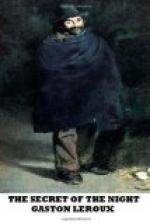“You did well, my love. Let us all do as well. I have passed an excellent night, messieurs. Real sleep! I have had just one long sleep.”
“That is so,” said Matrena slowly. “The general had no need of narcotic. He slept like a child and did not touch his potion.”
“And my leg is almost well.”
“All the same, it is singular that those grapes should have disappeared,” insisted the marshal, following his fixed idea.
“Ermolai,” called Matrena.
The old servant appeared.
“Yesterday evening, after these gentlemen had left the house, did you notice a small white box on the garden table?”
“No, Barinia.”
“And the servants? Have any of them been sick? The dvornicks? The schwitzar? In the kitchens? No one sick? No? Go and see; then come and tell me.”
He returned, saying, “No one sick.”
Like the marshal, Matrena Petrovna and Feodor Feodorovitch looked at one another, repeating in French, “No one sick! That is strange!”
Rouletabille came forward and gave the only explanation that was plausible — for the others.
“But, General, that is not strange at all. The grapes have been stolen and eaten by some domestic, and if the servant has not been sick it is simply that the grapes monsieur le marechal brought escaped the spraying of the Bordeaux mixture. That is the whole mystery.”
“The little fellow must be right,” cried the delighted marshal.
“He is always right, this little fellow,” beamed Matrena, as proudly as though she had brought him into the world.
But “the little fellow,” taking advantage of the greetings as Athanase Georgevitch and Ivan Petrovitch arrived, left the villa, gripping in his pocket the phial which held what is required to make grapes flourish or to kill a general who is in excellent health. When he had gone a few hundred steps toward the bridges one must cross to go into the city, he was overtaken by a panting dvornick, who brought him a letter that had just come by courier. The writing on the envelope was entirely unknown to him. He tore it open and read, in excellent French:
“Request to M. Joseph Rouletabille not to mix in matters that do not concern him. The second warning will be the last.” It was signed: “The Central Revolutionary Committee.”
“So, ho!” said Rouletabille, slipping the paper into his pocket, “that’s the line it takes, is it! Happily I have nothing more to occupy myself with at all. It is Koupriane’s turn now! Now to go to Koupriane’s!”
On this date, Rouletabille’s note-book: “Natacha to her father: ’But you, papa, have you had a good night? Did you take your narcotic?’
“Fearful, and (lest I confuse heaven and hell)
I have no right to take any further notes."* _______________
______________________________________________________
As a matter of fact, after this day no more notes
are found in Rouletabille’s memorandum-book.
The last one is that above, bizarre and romantic,
and necessary, as Sainclair, the Paris advocate and
friend of Rouletabille, indicates opposite it in the
papers from which we have taken all the details of
this story. _____________________________________________________________________




